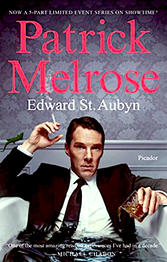A WRITER'S WIT |
My Book World

York: Picador, 2015.
I more often read a novel before viewing a film version, but less often do I read the novel after tuning into something like, say, Showtime’s “five-part limited series,” of the same title. It is one of those series which may have been equal to the book, or books, because Patrick Melrose is a compendium of St. Aubyn’s five novels about the same character, and it unfolds almost as luxuriously as the book.
Patrick Melrose may be one of the best contemporary novels to come to grips with the life of a drug addict. But more important, I believe St. Aubyn traces the aspect of abuse within a family over several generations, and how, unaddressed, it can devastate a family—wealthy or not. Substance abuse is merely a symptom of the deeper problems buried in the Melrose family history.
Patrick Melrose, born in 1960, approximately the same time as his creator, experiences physical abuse when his father perpetrates sodomy on him at an early age—repeatedly over several years. But then there is also the emotional abuse, when Patrick’s father, David, swears Patrick to secrecy or he will be “very severely punished” (79). (In the film, he says he will snap him like a twig.)
Patrick’s mother? Well, her abuse of him manifests itself as ignorance—blissful, willful ignorance of how David is treating their son. She, too, has suffered abuse as a child and at the hands of her husband, and they, without even trying, do their best to destroy Patrick’s life. What is most remarkable about this novel is that St. Aubyn manages to limn the skeletal remains of the several generations of this family without any shortcuts or platitudes. On the next to the last pages of the book, Patrick has earned the profound conclusions at which he arrives:
“He imagined himself as the little boy he had been at that time, shattered and mad at heart, but with a ferocious, heroic persona, which had eventually stopped his father’s abuses with a single determined refusal. He knew that if he was going to understand the chaos that was invading him, he would have to renounce the protection of that fragile hero, just as he had to renounce the illusion of his mother’s protection by acknowledging that his parents had been collaborators as well as antagonists” (855-6).
“He was after all not an infant, but a man experiencing the chaos of infancy welling up in his conscious mind. As the compassion expanded he saw himself on equal terms with his supposed persecutors, saw his parents, who appeared to be the cause of his suffering, as unhappy children with parents who appeared to be the cause of their suffering: there was no one to blame and everyone to help, and those who appeared to deserve the most blame needed the most help” (856)
I have only a couple of observations which might manifest themselves as criticisms: In spite of St. Aubyn’s lyrical and commanding prose, sustained over nearly nine hundred pages, I was often distracted. First, he participates in what American workshoppers call head-hopping, that is, employing the third-person omniscient point of view, not commonly used since the nineteenth century. Yet, I must probably applaud him because he manages to employ it with great skill, and, in a novel of this breadth, it is amusing and strategically important for the reader to know exactly what each character is thinking at any given time.
And two, the author uses, repeatedly, speech attributions which seem inappropriate or awkward. What do I mean? Any speech attribution, to my way of thinking, ought to be a synonym for the word “said,” or “spoke”: “declared,” “replied,” or similar verbs. Not so here: “The daughter is impossible,” grinned Laura (408). “Grin” is not a synonym for “said,” and it gives the sentence an amateurish patina. I wonder: Is this an acceptable practice in the writing of fiction within the United Kingdom? I should hope not. Another scathing example: “You may well ask,” scowled Nicholas (704). Seriously? How is “scowling” like “speaking?” This questionable practice is rife throughout the novel, marring what is otherwise impeccable prose, and could have been nipped in the bud by a good editor. Please help me to understand, Mr. St. Aubyn. Why would you do this to your book?
NEXT TIME: Final Installment of Defeating A Fib At Last



 RSS Feed
RSS Feed